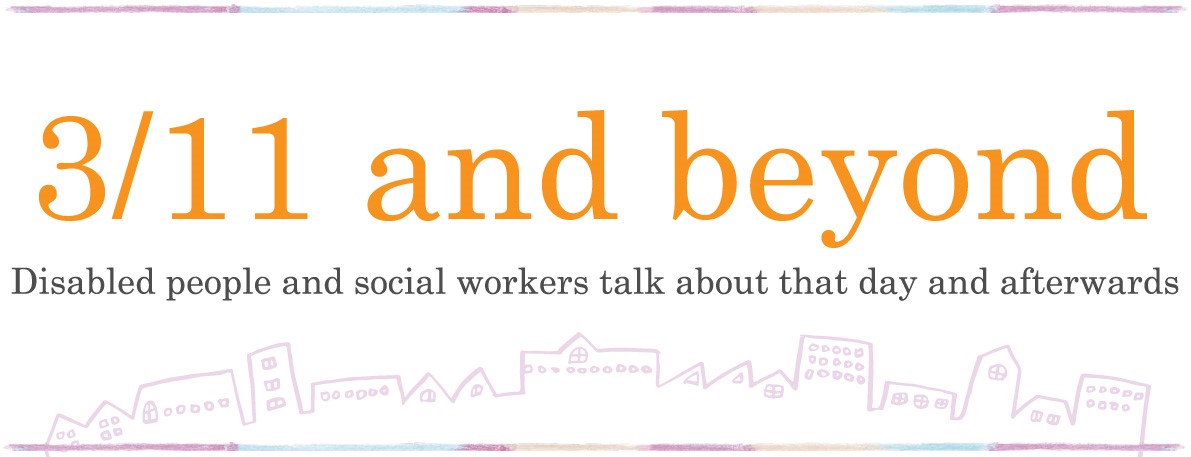Reason to live
Mindset after the disaster
Now that the area has recovered so much and the scenery has changed, do you want to return to Yuriage?
This place will close in March next year, so we talked with our son about whether we should return to Yuriage or move into government housing for disaster victims. But our son stopped us from returning to Yuriage, saying there might be another tsunami if another earthquake happens, and he was worried about us because we can’t hear. Yuriage is where I was born and raised, and it’s a place that’s familiar to me, but after what my son said I thought it wasn’t a good idea, and decided not to return. Even if we build a new house, if another earthquake comes it could be destroyed by sinking land and cracks and such, so we decided to give up on living in Yuriage.
Has your mindset changed since the disaster? Would you say you’ve found a new sense of purpose?
Earthquakes are still happening all around the country, and I’m worried that the same kind of earthquake could happen again somewhere else in Japan. My hobby is illustration, and I wanted to pass on the lessons I learned from this disaster to my grandchildren and great-grandchildren, so I made a file of illustrations documenting the disaster.
Have you shown this file or exhibited it somewhere?
I’ve gotten requests to borrow it from Osaka, Tokushima, Tokyo, Kobe, and so on.
I’m worried about the predictions of a Nankai Megathrust Earthquake happening in the future, so I hope my illustrations will help people be prepared when something like that happens.
Restarting
You restarted the workshop in Onagawa two years after the disaster. How were the people working there at the beginning?
When the reopening of the workshop was decided, people finally opened their mind and told frankly “I have been waiting all the time” or “It’s been so long.” Yes, they were holding their true feelings. Some were even worried how I was doing.
They were filled of hope, and their happiness was far beyond any words could express, I believe.
However, our place was the first built structure in town after the disaster, and many residents and companies were still struggling in rebuilding their lives and premises. I was hesitant to openly celebrate our achievement.
You felt some kind of constraint because there were gaps between who had basic necessities and who didn’t, and your place was the first building to have been built after the disaster.
I myself felt very difficult not to have place to go or work to do while I was in the evacuation center. I wanted to keep my work all my life if possible. I imagine our trainees who had worked at the workshop felt the same.
As we restarted, trainees felt so happy about the simple fact they had work to do, and they enjoyed it so much. They committed to the work and completed the tasks very quick. They are still very eager to work and they even look for more thing to do.
What do you think is keeping the motivation of both staff and the trainees?
It’s the fact that they have work to do. The most difficult part of vocational support projects is to create jobs, but it is the challenge staff members have to take. As the name “vocational support” clearly suggests, we always have to face this issue.
For future development
Do you still feel you are putting all your energy in the reconstruction, Ms. Matsubara?
I don’t think I’m putting all my energy, but I think things will go backward if we stop. My goal was to establish in Onagawa a place for people with disabilities to be able to work, and help it run smoothly. From this particular point of view, I feel I could achieve something.
Considering the characteristics of the area, I believe we don’t need to expand the capacity of this workshop in Onagawa.
However, I am always considering expanding the business and tasks. They are related to work flows and economic aspects such as efficiency of the work, their improvements, about making better quality products, and the way how we could raise the payment.
Not doing things frantically but calculating for better outcome and trying with helps of people around us; that is what we could do. If things don’t work out, we find ways to promptly withdraw. We need to secure not to accumulate financial loss, that’s the bottom line I think.
We have been doing in this way by trying different methods, I suppose.
What is Kirara Onagawa trying to do in view of its future?
It is to hand our visions down to next generations. There are two key points I need to convey to staff members. Our role of course is to support persons with disabilities for their employment.
Firstly, we need to form sense of due responsibility and skills to check our own work. It’s a plain standard for private companies.
Second point is not to spare any effort to help improve trainees’ skills.
I will try to convey these to the staff, and I hope they do the same to future generations. Expanding the things what trainees can do is beneficial both for them and for the workshop.
We, staff have to show how to do first. With efforts of the trainees themselves and the perseverance of the staff, they will acquire the skills. It would be ideal that one day a trainee pushes staff’s hands away and says “I don’t need your help anymore.”

